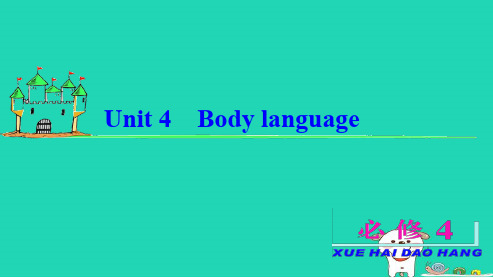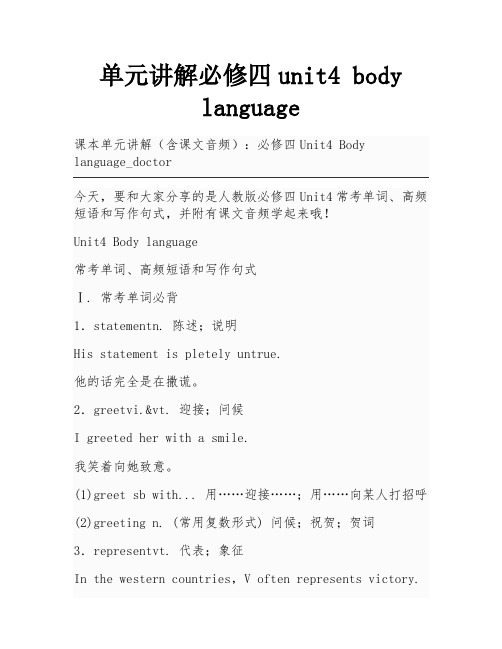Unit 4 Body language单元语言点.pdf
- 格式:pdf
- 大小:434.91 KB
- 文档页数:11


单元讲解必修四unit4 bodylanguage课本单元讲解(含课文音频):必修四Unit4 Body language_doctor今天,要和大家分享的是人教版必修四Unit4常考单词、高频短语和写作句式,并附有课文音频学起来哦!Unit4 Body language常考单词、高频短语和写作句式Ⅰ. 常考单词必背1.statementn. 陈述;说明His statement is pletely untrue.他的话完全是在撒谎。
2.greetvi.&vt. 迎接;问候I greeted her with a smile.我笑着向她致意。
(1)greet sb with... 用……迎接……;用……向某人打招呼(2)greeting n. (常用复数形式) 问候;祝贺;贺词3.representvt. 代表;象征In the western countries,V often represents victory.在西方国家,V常象征着胜利。
He represented himself as a doctor.他自称是一个医生。
[快速闪记](1)represent sth to sb 向某人说明某事,向某人传达某事represent...as... 把……描绘成……represent oneself as/to be... 自称是……(2)representative n. 代表4.curiousadj. 好奇的The children were curious to know what was happening over there.孩子们很想知道那边发生了什么事。
[快速闪记](1)be curious about 对(某事物)感到好奇be curious to do... 很想做某事;渴望做某事(2)curiously adv. 好奇地5.approachvt..&vi.接近;靠近;走近 n. 接近;方法;途径As summer approached,the weather became hotter and hotter.随着夏天的临近,天气越来越热。


必修四Unit 4 Body Language语言点总结Unit 4 Body LanguageWord usage:1.major 1) adj. more important or serious than other things2) v. major in sth. to study sth. as your main subject at university3) n. a subject you major in.The house needs major repairs.He is a major writer.Her major subject is chemistry.Alice majors in economics.His major is history.2. represent v. 1) to act officially for another person or group of people2) to be a sign for another thing3) to describe or show a person or thing in a particular way They said that they represented the committee.The dove represents peace.What does X represent here?3.curious adj. 1) [never before a noun] eager to know sth. or to learn about sth.2) odd or strangeThe boy was curious about everything he saw.We were curious about where she’d gone.I heard a curious noise last night.4. experience 1) n. a) [U] knowledge or skill which comes from doing or feeling sth. fora long time rather than from booksb) [C] sth. that happens to you and has an effect on your mind and feelings2) vt. to feel or to be influenced by sth. that happensShe had no experience of life at all.Have you had any experience of teaching English?Please tell us about your experiences in Africa.I had a rather odd experience the other day.We have experienced many defeats, but we believe that we will succeed.5. introduce v. make (a person) know to others; bring into useI introduced John to Mary last year, and now they are married.Would you please introduce yourself?Potatoes were introduced into Europe from South America.6. approach 1) vt. come nearer to; set to do2) n. the act of coming nearer; accessSilently we approached the enemy’s camp.The time is approaching when we will have to leave.The approach of winter brings cold weather.7. express 1) vt. put into words; show feelings;2) n. fast train or delivery; a rapid, efficient system for the delivery of goods and mailHe can not express how he felt about the matter.Could you express yourself in English?Send the letter by express.8. action n. deed or conduct; process of doingActions speak louder than words.We are tired of talking about the problem---now is the time for action.The police had to take firm action to deal with the case.9. general adj. involving or applying to all persons or things of a group or category; concerning the overall aspects of a subjectThere is a general feeling that this law isn’t working properly.The school gives a good general education.Worry about high food prices has now become fairly general.10. avoid v. keep away from; preventI avoided him as much as possible.They all avoided mentioning that name.She braked suddenly and avoided an accident.11. comedy n. amusing play or film; amusing incidentOne of his new comedies is to be presented.Do you prefer comedy or tragedy?There will be a comedy show in TV this evening.12. misunderstand v. unable to understand the correct meaning; misinterpretHis intentions were misunderstood.He misunderstood what I said.They pretended to misunderstand my complaint.13. similar adj. showing resemblance; resembling but not the same; of the same kind or amountHis problem is similar to yours.My view is similar to hers.They had similar opinion.14. expression n. communication of an idea, emotion, etc.; the manner that expresses feelingI sent them flowers as an expression of thanks.There was no expression on her face."Shut up" is not a polite expression.15. agreement n. accord or harmony of opinion and way of thinking; treatyMy parents are in agreement on what color to paint the house.The three sides reached an agreement to stop the war.We are in agreement with their decision.16. chest n. part of the body wrapped by ribs and the breastbone; big strong box for storing things in; treasury of a public institution.He has a severe pain in the chest.He’s got a weak chest.I keep the tea in a chest.18. gesture n. movement of the body to express an idea, intentions or attitude.v. to make a gesture.We hold a party for our new colleagues as a gesture of friendship.Handshake is a gesture of friendship.She was gesturing so excitedly that I knew something was wrong.19. adult 1) n. group-up or mature person2) adj. grow-up or matureHe'd spent all his adult life in the army.Sam is a rather adult child.In this sense, children and adults have equal rights.20. punish v. to inflict penalty onMotorists should be severely punished for speeding.The teacher punished her students for cheating in the exam. He has never been punished by his parents.。


重点短语(必修 4 Unit 4 Body language)(讲义)高中英语重点短语(必修 4 Unit 4 Body language)1. 学习短语的基本含义和用法。
2. 灵活运用所学的短语,学会用短语造句。
重点:短语at ease, in general, lose face, in most cases的用法。
难点:与face有关的短语和case的相关用法。
【短语学习】1. at ease舒适;快活;自由自在(相当于comfortably)with ease轻易地,毫不费力地(相当于easily)feel/look at ease 感到/看上去轻松自在put/set sb. at ease 使某人感到轻松自在take one’s ease 休息,放松一下stand at ease (口令)稍息When you feel nervous, you’d better listen to some light music to put yourself at ease.当你感到紧张时,你最好听些轻音乐使自己放松一下。
I never feel completely at ease with him.我跟他在一起总感到不是很自在。
Don’t overwork yourself and take your ease.不要过度劳累,休息一会儿。
The most universal facial expression is,of course,the smile—its function is to showIn general, though, studying international customs can certainly help avoid difficulties in today’s world of cultural crossroads!总的来说,在当今文化交融的世界里,学习不同国家的习俗肯定能够帮助我们避免交往中的困难!Her English pronunciation is not so bad in general.她的英语发音一般来说是不错的。
必修四unit 4 body language 知识点1. represent vt.象征;代表;(尤指以绘画,雕刻等)表现;描绘;描写representative n.代表;众议员adj.典型的;有代表性的辨析represent/stand for/on behalf ofrepresent 指“代表某人/某个团体/政府等,或指某种标志代表什么,某物表现/描绘的是什么”。
stand for 通常指字母、数字、符号等代表/象征什么。
on behalf of 指代表/代替某人,只能作状语。
2. approach vt.接近,走进;着手处理n.接近,临近;方法,途径辨析approach/way/method/meansapproach “方法”,还有“接近”的意思。
an approach to(介词)“……的方法”。
way 构成in the way“用这种方法”,the way to do/the way of doing (to 为不定式)“做某事的方法”。
method 构成with a method “用一种方法”。
means 意为“方式,方法”。
单复数同形,构成by means of “通过……方法”。
3. defend v.防护;辩护;防守;保卫defence n.保卫,防御;防卫设备;(被告的)答辩;辩护常用结构:defend oneself 自卫,辩护defend oneself from/against 保护自己免受……in defence of 保卫……;为……辩护注意:defence后接“入侵者”或“造成危害者”时用介词against;若后接“被保护者”时用介词of。
4. major adj. 主要的;vi. 主修majority n.大多数minority n.少数,少数民族5. misunderstand-misundstood-misunderstood vt. 误解,误会misunderstanding adj.n. 误解,误会6. adult n. 成年人adj.成人的,成熟的7. simple adj. 简单的simply adv. 简单的,只是8.function n. 功能;职能;作用(vi.)起作用;运转functional adj. 功能的9.spoken adj. 口语的unspoken adj. 未说出口的;非口语的10. face n. 脸facial adj. 面部的11. true adj. 真实的,真诚的;真正的truly adv.真实地,真诚地;真正地12. hug vi. & vt. 拥抱give sb. a hug 拥抱某人13. curious adj.好奇的,感兴趣的;奇异的,不同寻常的curiosity n.好奇curiously adv.好奇地be curious about 对……感到好奇be curious to do 急于做/极想做out of curiosity 出于好奇14. likely adj.可能的(表示可能性很大时,可用most,very修饰likely)It is likely that sb. ...=sb. is likely to do...某人可能做某事not likely (表示坚决不同意)绝不可能;绝对不会15. ease n.安逸;舒适v.减轻(痛苦,忧虑);缓和;放松at ease 感到舒适而无忧虑;感到放松,不拘束with ease 毫不费劲地,轻而易举地16. lose face 丢脸lose heart 泄气;灰心lose one’s heart to 爱上;钟情于lose weight 减肥lose one’s way 迷路lose one’s life 丧生lose courage 丧失勇气lose sight of 看不见17. turn one’s back to 背对,背弃18. subjective adj. 主观的;objective adj. 客观的19. on the contrary 相反20. in general 总的来说,通常generally speaking 总体而言;一般而言on the whole 总的来说in a word 总之in short 简言之21. put up 举起;升起;搭建;留宿22. be wrong about 误解。
【14单元总结】1.interact v 互动、交流→interaction n 交流interact with与...交流;相互影响:2.vary vi (根据情况)变化;改变—variety n 变化;多样化/性-→various. adj 各种各样的(1)随...而变化: vary with(2)从...到...不等: vary/differ from…to…(3)在...之间变化: vary between….and…..(4)许多的,大量的;a variety of =varieties of3.appropriate adj 合适的;恰当的(1)适用于;合乎be appropriate/suitable for/to(2)对某人来说做某事是合适的It is appropriate for sb to do sth4.approve vi 赞成vt 批准-→approval n 赞成(1)赞同/同意(某人)做某事approve of doing sth(2)未经...许可: without the approval of5.employ vt 使用;雇用→employer n 雇主-→employee 雇员→employment n 工作;就业(1)雇用某人担任...:employ sb as(2)雇用某人做某事:employ sb to do sth(3)从事/忙于做某事:employ oneself in doing sth→be employed/busy/occupied in doing sth(4)采用新方法: employ new methods6.favor vt 较喜欢;有利于n. 帮助;恩惠;赞同→favorable 赞同的,有利于→favorite adj(1)支持、赞同: in favor of(2)求某人帮一个忙: ask a favor of sb(3)欠某人一个人情:do sb a favor(4)帮某人一个忙: owe sb a favor7.slight adj 轻微的;略微的;细小的→slightly adv 略微;稍微机会渺小: a slight chance8.assessment n. 评价;评定→assess vt. 评估(1)对...做出评估: make an assessment of(2)估价assess sth at9.reveal vt 显示;露出;揭示(1)向某人透露某事: reveal sth to sb(2)泄露秘密reveal the secrets10.occupy vt 占据;占用→occupation n 工作;职业;占领→occupied adj 已占用的,忙于的(1)忙于做某事: occupy oneself with sth→be occupied with sthoccupy oneself in doing sth→be occupied/busy/engaged/involved in doing(2)全职工作: a full-time occupation11.distinguish vi/vt 区分;辨别→distinguished adj 卓越的;著名的(1)区分A与B: distinguish A from B/ A and B(2)显扬自己;表现突出: distinguish oneself(3)因...而著称: be distinguished/famous for(4)作为...而著名: be distinguished as12.anxiety n. 焦虑;担心;害怕→anxious adj 忧虑的,担心的;渴望的→anxiously急切地(1)为...担心: be anxious about sth(2)渴望得到某事: be anxious for sth(3)渴望/急于做某事: be anxious to do sth(4)焦虑地: with anxiety13.embarrass vt 使尴尬→embarrassed难堪的;尴尬的→embarrassing令人尴尬的;令人难堪的→尴尬embarrassment(1)因...感到尴尬、窘迫: be embarrassed about/at(2)尴尬、窘迫地做某事: be embarrassed to do sth(3)使某人尴尬的是: to one’s embarrassment14.ashamed adj 惭愧,惭愧→shame n 惭愧;羞愧;羞耻;让人遗憾的事→shameful adj 可耻/丢脸的-→shameless无耻的,不知羞耻的(1)为...感到羞耻/惭愧: be ashamed of(2)因惭愧而不情愿做某事: be ashamed to do sth.15.adjust vt 调节vi/vt 适应→adjustment n调整,调节→adjustable adj可调整的(1)习惯做某事: adjust to doing sth(2)使自己适应某事: adjust oneself to sth(3)作出调整: make adjustments(4)可调节的座椅安全带: adjustable seat belts16.react vi (对...)起反应;回应;(对食物)有不良反应—reaction n 反应(1)对...作出反应;回应: react to(2)对…作出的反应: in reaction to17.reliable adj.可信赖的→rely v. 信任;依靠rely on sb to do sth 指望某人做某事rely/depend on it that ... 相信/指望……18.tendency n.趋势→tend v.易于;照顾(1)have a tendency to 有……的趋势/倾向(2) tend to do sth 经常做某事;有做…的倾向19.conflict n矛盾;冲突vi.冲突;抵触→conflicting adj矛盾的in conflict with 和……有矛盾,不一致a conflict of interest利益冲突armed/military conflicts武装/军事冲突20.bother v. 费心;因…操心n.麻烦;不便bother sb with/about sth 为某事打扰或麻烦某人bother to do/doing sth 费心做某事It bothers sb that/to do sth 使某人苦恼的是21. break down坏掉,出故障;消除(隔阂等);身体垮掉/精神崩溃;使分解为…break through战胜,突围break out (战争、火灾等)爆发break in 打断;插嘴;闯入(不及物动词短语) break into 闯入(及物动词短语)break up 分散;拆散;驱散;(关系等)破裂break away from 脱离(政党);打破(陈规、陋习)22.in other words 换句话说;也就是说in a/one word 总之;简言之word comes/came that ... 有消息说…beyond words无法用言语表达have words with sb与某人吵架keep one's word 遵守诺言break one's word 失信;不守诺言eat one’s word收回前言23.call on (短暂)访问;要求(讲话);正式邀请call on sb to do sth 号召/呼吁某人做某事call for 要求;呼吁;需要call off 取消call up memories使回想起24.by contrast 相比之下使...与...形成对比: contrast…with…25. by comparison(with sth )相较之下作对比:make a comparison把...比作、、compare ….to…把...与...比较: compare…with…26.at work :有某种影响;在工作(1)与...交战:at war with(2)出于和平状态: at peace(3)在吃饭: at table(4)在做礼拜: at church(5)在航海;茫然: at sea27.make inferences 推理;推断28.a witness to …的见证/ 目击者(vt.目击见证)29.be counting the minutes\hours 翘首以待30.make sb. tick使某人这样做的原因(v.打钩发出滴答声;n.勾号)31.clarify a situation 澄清情况Body language身体语话题词汇1.Eye contact+Facial expressions+(1)slight frown微皱眉raise one’s eyebrows扬眉(2)with eyes widened in disbelief睁大了眼睛(3)yawn打哈欠weep (wept,wept) 哭泣,流泪(4)break into a joyful/broad/bright smile灿烂地笑(5)stare at盯着glare at怒目而视glance at一瞥(6)bow 鞠躬点头低(头)(7)lower/bend one's head低头(8)nod/shake one's head点/摇头3.Gesture+Posture:(1)shoulders drop with relief肩膀松了一口气(2)sit up straight坐直straighten up直起身(3)lean forward前倾jumped to one's feet跳起来(4)clap拍手applaud鼓掌thumbs up赞同;(5)fold one's arms双臂交叉在胸前(6)wrap sb in one's arms=hug/embrace拥抱1.interact v 互动、交流→ n 交流interact 与...交流;相互影响:2.vary vi (根据情况)变化;改变—variety n 变化;多样化/性-→various. adj 各种各样的(1)随...而变化: vary with(2)从...到...不等(3)在...之间变化: vary between….and…..(4)许多的,大量的3.appropriate adj 合适的;恰当的(1)适用于;合乎(2)对某人来说做某事是合适的It is appropriate for sb to do sth4.approve vi 赞成vt 批准-→approval n 赞成(1)赞同/同意(某人)做某事(2)未经...许可5.employ vt 使用;雇用→ n 雇主→ 雇员→employment n 工作;就业(1)雇用某人担任...:employ sb as(2)雇用某人做某事:employ sb to do sth(3)从事/忙于做某事:(4)采用新方法: employ new methods6.favor vt 较喜欢;有利于n. 帮助;恩惠;赞同→ 赞同的,有利于→favorite adj(1)支持、赞同:(2)求某人帮一个忙: ask a favor of sb(3)欠某人一个人情:do sb a favor(4)帮某人一个忙:7.slight adj 轻微的;略微的;细小的→slightly adv 略微;稍微机会渺小:8.assessment n. 评价;评定→assess vt. 评估(1)对...做出评估:(2)估价assess sth at9.reveal vt 显示;露出;揭示(1)向某人透露某事: reveal sth to sb(2)泄露秘密10.occupy vt 占据;占用→occupation n 工作;职业;占领→occupied adj 已占用的,忙于的(1)忙于做某事: occupy oneself sthoccupy oneself doing sth(2)全职工作:11.distinguish vi/vt 区分;辨别→ distinguished adj 卓越的;著名的(1)区分A与B:(2)显扬自己;表现突出: distinguish oneself(3)因...而著称:(4)作为...而著名: be distinguished as12. n. 焦虑;担心;害怕→anxious adj 忧虑/担心的;渴望的→anxiously急切地(1)为...担心:(2)渴望得到某事: be anxious for sth(3)渴望/急于做某事:(4)焦虑地:13.embarrass vt 使尴尬→embarrassed难堪的;尴尬的→ 令人尴尬的;令人难堪的→ 尴尬embarrassment(1)因...感到尴尬、窘迫: be embarrassed about/at(2)尴尬、窘迫地做某事(3)使某人尴尬的是:14.ashamed adj 惭愧,惭愧→ shame n 惭愧;羞愧;羞耻;让人遗憾的事→shameful adj 可耻/丢脸的-→shameless无耻的,不知羞耻的(1)为...感到羞耻/惭愧:(2)因惭愧而不情愿做某事: be ashamed to do sth.15.adjust vt 调节vi/vt 适应→adjustment n调整,调节→ adj可调整的(1)习惯做某事: adjust to doing sth(2)使自己适应某事:(3)作出调整:(4)可调节的座椅安全带: adjustable seat belts16.react vi (对...)起反应;回应;(对食物)有不良反应—reaction n 反应(1)对...作出反应;回应: react to(2)对…作出的反应:17adj.可信赖的→rely v. 信任;依靠rely on sb to do sth 指望某人做某事相信/指望……18.tendency n.趋势→tend v.易于;照顾(1)有……的趋势/倾向(2) tend to do sth 经常做某事;有做…的倾向19.conflict n矛盾;冲突vi.冲突;抵触→conflicting adj矛盾的和……有矛盾,不一致a conflict of interest利益冲突armed/military conflicts20.bother v. 费心;因…操心n.麻烦;不便bother sb with/about sth 为某事打扰或麻烦某人bother to do/doing sth 费心做某事使某人苦恼的是21. 坏掉,出故障;消除(隔阂等);身体垮掉/精神崩溃;使分解为…break through战胜,突围break out (战争、火灾等)爆发打断;插嘴;闯入(不及物动词短语) break into 闯入(及物动词短语) break up 分散;拆散;驱散;(关系等)破裂脱离(政党);打破(陈规、陋习)22.in other words 换句话说;也就是说in a/one word 总之;简言之有消息说…无法用言语表达have words with sb与某人吵架keep one's word 遵守诺言break one's word 失信;不守诺言eat one’s word收回前言23.call on (短暂)访问;要求(讲话);正式邀请号召/呼吁某人做某事call for 要求;呼吁;需要call off 取消使回想起24. 相比之下使...与...形成对比: contrast…with…25. by comparison(with sth )相较之下作对比:把...比作、、compare ….to…把...与...比较: compare…with…26.at work :有某种影响;在工作(1)与...交战:at war with(2)出于和平状态: at peace(3)在吃饭: at table(4)在做礼拜: at church(5)at sea27.推理;推断28.的见证/ 目击者(vt.目击见证)29.be counting the minutes\hours30.make sb. tick(v.打钩发出滴答声;n.勾号)31.澄清情况Body language身体语话题词汇1.Eye contact+Facial expressions+(1)slight frown微皱眉raise one’s eyebrows扬眉(2)睁大了眼睛(3)yawn打哈欠weep (wept,wept) 哭泣,流泪(4)灿烂地笑(5)stare at盯着glare at怒目而视一瞥(6)bow 鞠躬点头低(头)(7)低头(8)nod/shake one's head点/摇头3.Gesture+Posture:(1)肩膀松了一口气(2)sit up straight坐直straighten up直起身(3)lean forward前倾跳起来(4)clap拍手applaud鼓掌thumbs up赞同;(5)fold one's arms双臂交叉在胸前(6)拥抱。